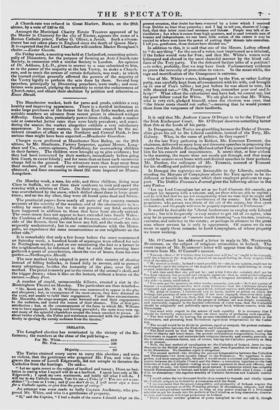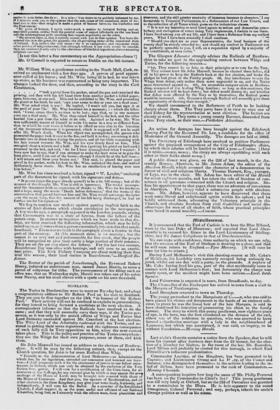Mr. O'Connell has addressed a letter in reply to Mr.
Wentworth Beaumont, on the subject of religious animosities in Ireland. The exact import of Mr. Beaumont's letter will appear from the following extracts from Mr. O'Connell's answer.
" You ask—first —' If I believe that Ireland ever will be,' or • ought to be tranquil, until the religion of the majority is placed on an equal footing, in every respect, with that of the minority ? ' " My answer is ready : Ireland cannot possibly be—she, in my opinion, ought not to be tranquil—until the religion of the majority is placed on no equal footing. in every respect, with that of the minority.
" 1 add, that until then she will not be ; and w !tile I live she certainly shall nut be free from salutary, but peaceful and energetic agitation—that is, until pet il.ss religious equality—without one particle of political, civil, or temporal ascendancy at either or any side—is firmly established. "You next put the question in other words—secondly, you ask—' Is it not a point of honour —a consideration tam iliac with over) I istiman—that the Catholics should be religiously and politically open au equal level. without reserve, with the Protestants?' " By point of honour, I understand you to meat, motive of action tan which the feelings and passions of men are equally, it not more engaged, than eve-u their judg- ment nod reason. I tell you, then, that the reason, the judgment, the best feelings, au 1 the most ennobling passions of the people of Ireland. are sow deeply, resolutely, and Irrevocably engaged in the familiar conviction of every man, that the Catholics should be religiously and politically upon au equal level, without reserve, with the Protestants.
" One word with respect to the nature of such equality. it is necessary that I should be distinctly understood—there are three modes of producing such equality. •• The first would be by leaving the present establishment of temporalities to the Protestants, and procuring from Pioliament equivalent temporalities fur the Catho- lics.
., The second would be to divide in portions, equal or unequal, the present ecclesias- tical temporalities between the Protestants anal Catholics. " The third would be that the State should appropriate to education, and other works of charity and benevoleuce, the present ecclesiastical temporalities, leaving the Protestants to support and maintain their religious hierarchy and worship precisely as the Catholics maintain theirs, and, of course. leaving the Catholics precisely as they are at present.
" Now, the first method of equalisation we, the Catholics of lrelard, deem to,, bur- densome to the British nation to be practical ; awl, even if practical, we deem it unjust to the Dissenters. We therefore reject it altogether.
" The second method—the dividing the present temporalities between the Catholics and Protestants--we deem equally unjust to the Dissenters. We repudiate it alto- gether. and most unequivocally, because it would create a criminal and disastrous con- nexion between the Catholic Church and the State—a connexion injurious to the best interests of truth and religion—taking away from argument its force and efficacy, and from piety its only, but transcendently great reward. A connexiou which has certainly injured Protestantism iu Ireland, and could only tendril and defile what I deem -I say it in no discourtesy—the superior sanctity of Catholic doctrines and Catholic institu- tions.
" I would rather die ten thousand deaths thou consent to degrade and vitally injure the Catholic religion in Ireland by a connexion with the State. " I am cons inced that the peace, tramptillit y, std prosperity of Ireland, squire the est.iblislitnent amongst Its of the Voluntary princiyh of maintaining religion; and that as long as any peenuiary ascendancy. as long as any power remains to a Protestant minister to put his hands into the pockets Of the Cclthuliat, so long dissension, dissatis- faetioti, and turmoil, will reign paramount iu Ireland. "There remains another (votive of yours uureplied to—let Me call it, though earner in your letter, the there. h is this—' You desire to be publicly informed by me, If i coincide soh you in the (pinion that the sole cause of the unnatural state of Ire- land lies in ihis—that religion is made a point of honour between the Catholics and the Protestatos: "By piatit of honour, I again understand, a motive to irritated feeling and ex- asperated passion, arisInz from the painful sense of unjust inferiority on the one band and the contemptuous pride resulting from unjust superiority on the other. "My answer, then, is. that 1 entirely concur silk you in that opinion. You have ills- eovered the true, the great,tbe gigantic, the all-pervading cause of the unnatural state of Ireland. It is, indeed, the sole cause t• for it so exasperates awl envenoms every other portion of misgovernment. that although without it our evils could he curable, they are rendered deadly only by the admixture of this fatal ingredient of ever-recurring religious raneour."
[Is not this letter a fine commentary on the Appropriation-clause ?] Mr. O'Connell is expected to return to Dublin on the 9th instant.































 Previous page
Previous page